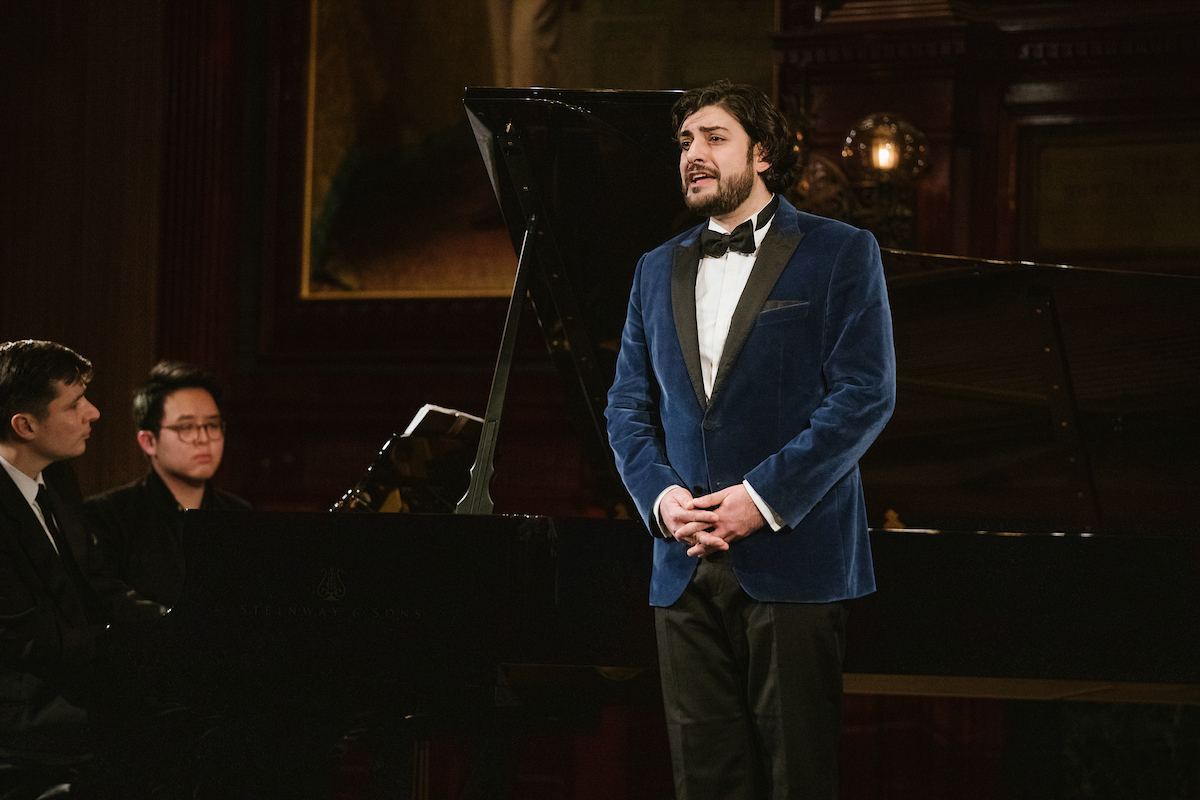Tenor Ilker Arcayürek Sings Schubert At the Armory
/By Raymond Beegle
3/10/2019
Photos by Da Ping Luo
“Only the stupid believe that to be truthful is easy,” wrote Willa Cather; “…only the true artist knows how difficult it is.” The truth was told, and told eloquently on Thursday, February 14th, when tenor Ilker Arcayürek and his remarkable accompanist, Simon Lepper, presented a program of Schubert songs in the newly restored Board of Officers Room at New York’s Park Avenue Armory. The setting, an oak paneled room holding a few hundred people, could not have been more ideal acoustically or visually, and is just large enough to accommodate what is left of the city’s serious and knowledgeable musical public.
Schubert often accompanied himself when singing his songs, but only such an arrangement could have made the unity of dramatic tone, dynamics, and phrasing between singer and pianist more complete than what was heard on this winter’s evening.
Ilkar Arcayürek’s program was different from what one encounters in the larger theaters like Carnegie Hall or whatever might be the current name of the hall that houses our Philharmonic Orchestra. Although there were a few chestnuts, the repertoire constituted a carefully chosen collection of mostly introspective works, designed, it seems, to be thought-provoking rather than simply entertaining. Most notable were the Harper’s Songs from Wilhelm Meister. “He who has not eaten his bread with tears… knows you not, ye Heavenly Powers” evoked a profound silence in the hall, the kind of silence that is more significant than an ovation. It issued from that perfect alliance of poet, composer, and artist, which has the power to reach deep into the heart of the listener.
From the standpoint of style, no composer sets greater challenges to an artist than Schubert. An absolutely requisite balance between the musical sophistication of nineteenth century Vienna and the guileless simplicity of the “Volk” is not easily achieved. This rare balance is a constant in few pianists but it was present tonight in the playing of Simon Lepper. There is expansive imagination in his work, as well as the wonderful quality of self-forgetfulness. His technical freedom seems as natural to him as the faculty of speech to the common person, and he produces a tone of lustrous beauty while impeccably voicing individual chords, and concurrent musical lines. A profound sense of rhythm, the original heartbeat of the poem that ultimately produced both word and song, seems to be the foundation and cornerstone of his music making. As a reviewer, I have, over four decades, listened carefully to hundreds of Schubert recitals, and although the quality of accompanists in Europe has never been finer, the finest of them all seems to be Simon Lepper.
Tenor Ilker Arcayürek also possesses the elements necessary to make Schubert’s worlds come to life. His modesty and sincerity allow the music to speak for itself, and he exhibits none of the posturing and overstatement that are presently in vogue among many of our vocal celebrities. His handsome voice, flawlessly produced, is of a brilliant, sometimes overly brilliant quality and of a single inexorable color. It does not respond to the nuance of thought and feeling as spontaneously as the great artists of the past like Karl Erb or Heinrich Rehkempfer, or our best contemporary recitalists, the Dutch tenor Peter Gijsbertsen and the French Baritone Stéphane Degout, whose timbres have a wider range of tone and expression. Still, Mr. Arcayürek is a superlative artist, and has very wisely aligned himself with an accompanist who underscores and emphasizes various effects that his voice alone is unable, as yet, to accomplish.
So, “the truth,” that Beethoven “loves more than anything,” that Tolstoy “loves with all the power of his soul,” and that Seneca says “is a simple language,” was heard tonight, and one left the theater with the feeling that art and the artists had done their tasks well, having made us a little better, a little kinder, a little more grateful.
Raymond Beegle reviews classical music and opera for the New York Observer and Fanfare Magazine. For many years he was Contributing Editor of Opera Quarterly, the Classic Record Collector (UK), and also appeared on The Today Show (NBC) and Good Morning America (CBS). As an accompanist, he has collaborated with Zinka Milanov and Licia Albanese. Currently Mr. Beegle serves on the faculty of Manhattan School of Music in New York City.




